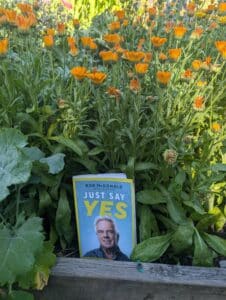Book review: exciting memoir that reads like a novel

McDonald’s parents left school early, and so he had no motivation to stick with his own studies. His homelife was at times traumatic, and although he struggled in school, he went on to university, but eventually dropped out.
Later in his career, he stunned an audience of young university graduates when he said, “So, I guess you’re wondering how an uneducated person like me became the host of our national science radio program, science correspondent for our national TV network, author of numerous books.”
He went on to reveal that, “It is all thanks to family, friends and mentors who opened doors of opportunity and for some reason, I found the courage to say yes and step through those doors. Even though I wasn’t officially qualified to do any of these jobs.”
This statement really sums up McDonald’s life journey; by being curious and open to new opportunities, he has enjoyed outstanding success. As a boy in school plays, he realized he could grab an audience’s attention and wow them. With this bravado (and a girlfriend who worked at the Ontario Science Center), McDonald found his way to a job as a demonstrator, a role where he was to entertain the audience with science experiences and a lot of silliness. He was in his element, and six years later he left as a freelance science journalist.
McDonald has been an avid and accomplished sportsman all his life, including pursuits of skating, hiking and swimming in his hometown of Orilla, to motorcycling and sailing. They were all undertaken with enthusiasm and in time, skill. He freely divulges a few frightening instances when sailing, times when things could have gone very, very wrong. Space is McDonald’s favourite form of science, and so when he had the opportunity, he plucked up the courage to ask Buzz Aldrin (second man to walk in the moon), and then a senator, to come sailing with him. The response of “Sure why not?” had McDonald imaging the headlines; “Famous Astronaut Drowned by Idiot Canadian Captain.”
McDonald often pokes fun at himself and when the opening line to one chapter reads, “OK, I know my teeth are not straight,” you know there’s a good story coming. Growing up in a home where there was little money, a trip to the dentist was out of the question, and the notion of having them straightened, inconceivable. By the time he was twenty, his teeth were in bad shape and after bearing the pain for years, McDonald had six of his teeth pulled and then fourteen fillings placed in those that could be saved.
He and the dentist talked about having his teeth straightened; “You have a very dynamic personality with a big smile, people have accepted the way you look up until now, so going through years of braces to get a straighter smile may not make much of a difference. So think about it.” McDonald did think about it, but as his media career was just taking off, and he was already accepted for how he looked, he decided to leave it.
McDonald understands that he has been very fortunate to have travelled the world, learning about, and reporting on many aspects of science, from volcanoes in Italy, mountain gorillas in Botswana, to the Great Barrier Reef in Australia. This exposure and the research needed to fulfill his work brief, gave him the tools to speak to scientists, but McDonald had the knack to ensure it was in a language the audience could understand. If he was interviewing a scientist who was explaining a tricky concept, McDonald would ask, “Let me see if I understand,” before reiterating the idea in simpler terms. His aim is to make science acceptable, especially to kids (aged eight to fourteen are his favourite), to engage them in hopes they will come to care about a variety of aspects of science.
McDonald has spent decades fulfilling his mother’s adage, “Get out of the house” and suggests that everyone should travel to see and experience as much as possible. “And if cost is an issue, take out a loan. Remember, they can’t repossess a trip!” Though he may not have a university degree, McDonald is a thoughtful and observant writer, and whether he is discussing climate change or Pluto’s demotion, he delivers with an ability to motivate and inspire.
McDonald appears twice at the festival, first at the Literary Cabaret on Oct. 18 and then at the Sunday BookTalk and Breakfast on Oct. 20. Tickets are on sale now.
Bob McDonald has been the host of CBC Radio’s Quirks and Quarks since 1992. He is a regular science commentator on CBC News Network and science correspondent for CBC TV’s The National. He has received the Michael Smith Award for science promotion, Sandford Fleming Medal, McNeil Medal for the public awareness of science, and in 2011 became an Officer of the Order of Canada. He is the recipient of thirteen honorary doctorates. In 2014, asteroid 332324 was officially named BOBMCDONALD in his honour. He lives in Victoria, BC. His memoir, Just Say Yes, is out now.
A version of this review first appeared in the Whistler Pique Newsmagazine.
Review is by Libby McKeever. McKeever is a retired youth librarian, an avid reader and writer of both fiction and creative non-fiction. Libby appreciates the easily digestible science that Bob McDonald delivers. Always topical and entertaining, she remembers watching Wonderstruck with her kids in the 90s and for the past 40 years, has often listened to Quirks and Quarks on Saturdays.
